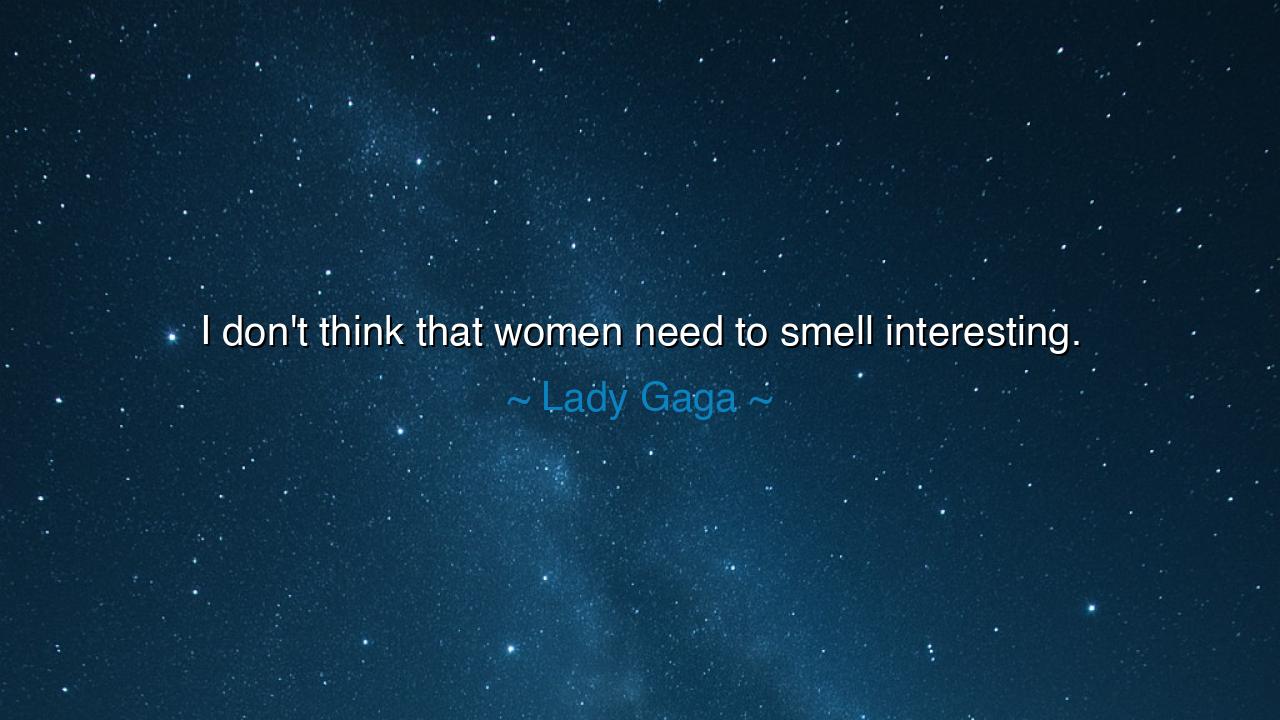
I don't think that women need to smell interesting.






O children of the future, hear the bold words of Lady Gaga, who, with a voice that echoes the defiance of the ancients, declares, "I don't think that women need to smell interesting." In these words, she rejects the superficial demands that society places on women to conform to external standards of beauty and allure. To smell interesting is but a metaphor for the many ways in which women are expected to craft themselves to fit the desires of others, be it in appearance, behavior, or the roles they play in society. Lady Gaga challenges this notion, calling on women to reject the pressure to meet these artificial expectations and instead embrace their own authenticity and power.
In the ancient world, the myth of Pandora serves as a poignant example of how women were seen as vessels of allure and temptation. Created by the gods, Pandora was given a jar that, when opened, unleashed all the evils of the world. Her very existence became a symbol of the way women were viewed—not as beings of strength and substance, but as objects of fascination whose value lay in their allure. Like Pandora, many women have been taught that their worth lies in their appearance, their ability to charm or captivate others. Yet, Lady Gaga's words offer a new vision: that a woman’s worth is not to be measured by how interesting she appears to others, but by the depth of her character, her intelligence, and her individuality.
Consider the story of Joan of Arc, who was no object of interest for her beauty or allure, but for her courage and vision. Joan’s greatness lay in her ability to defy the norms of her time and lead armies, not by her outward appearance, but by the strength of her convictions. In the face of overwhelming odds, she became a symbol of leadership, not because she smelled interesting or met any superficial standards, but because she embodied the spirit of resilience and purpose. Her story reminds us that women are not defined by external expectations, but by the actions they take and the legacies they leave behind.
In the modern world, the rise of feminist movements has sought to empower women to break free from the confines of such external demands. Simone de Beauvoir, in The Second Sex, famously wrote that women had long been seen as the Other, defined in relation to men and their desires. Like Lady Gaga, de Beauvoir challenged the view that women should exist only to please or serve others, urging them instead to embrace their autonomy and self-determination. The notion that women must be interesting or alluring in the way society expects is a limiting and oppressive force, and only by rejecting it can women truly claim their full freedom.
O children, let Lady Gaga's defiant words inspire you to see that women’s true worth lies not in how they appear to the world, but in who they are at their core. The world may try to define women by their appearance or their ability to please, but true power comes from within—from the strength of their convictions, their vision, and their uniqueness. Just as the ancients once told tales of women who defied the roles imposed upon them, so too must we encourage the women of the future to embrace their own truth, unburdened by the need to smell interesting or conform to the desires of others. The future belongs to those who are bold enough to be themselves, to reject the masks that society places upon them, and to shine with the brilliance of their own identity.






NNam
Lady Gaga’s comment brings attention to the often-overlooked pressures on women to constantly present themselves in a certain way, even in their scent. It's a reminder that women, like everyone else, should be valued for more than just how they look or smell. Do you think the idea of ‘smelling interesting’ is more about consumer culture than actual personal choice? How do you think women can reclaim control over these expectations?
PLNguyen Phuc Lam
Lady Gaga has always been one to push boundaries, and this quote is no exception. By saying that women don’t need to smell ‘interesting,’ she seems to be questioning the importance society places on appearance and pleasing others. Do you think this speaks to a larger issue of how women are often judged based on their outward presentation rather than their character or abilities? What would it take to change this mindset?
NTNguyen Thu
This quote from Lady Gaga feels like a commentary on how women are often reduced to their physical attributes, including how they smell. It’s a bold stance against the expectation that women should be ‘pleasing’ in every way, even down to their scent. How does this perspective challenge traditional notions of beauty and femininity? Can rejecting such norms empower women to embrace their authenticity without pressure to conform to these ideals?
LBLynh Bao
Lady Gaga’s statement really challenges societal expectations about women and their appearance. The idea that women don’t need to ‘smell interesting’ is an interesting take, especially in a world where fragrances and beauty products are often marketed as essential to femininity. Do you think there’s a deeper message here about rejecting superficial beauty standards? What does it mean for women to be seen as interesting beyond just their scent or physical appearance?